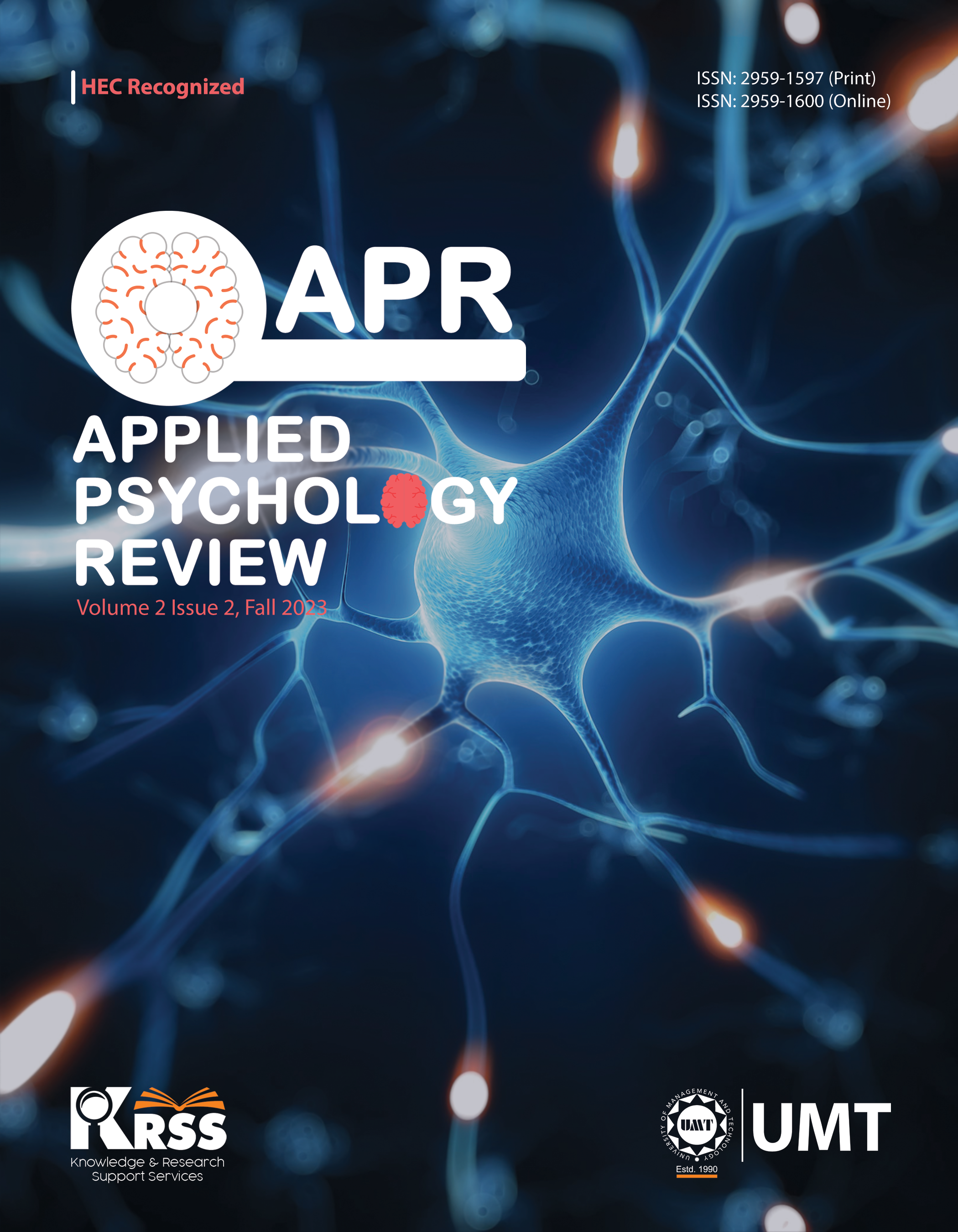Binge-Watching as Behavioral Addiction: A Systematic Review
Abstract
 Abstract Views: 0
Abstract Views: 0
In the recent past, binge-watching has emerged as one of the most prevalent pursuits among adults. Being a relatively new phenomenon, there is a pressing need to examine the literature on the associations of binge watching with various psychological correlates such as cognitive processes, emotional regulation, moods and sleep patterns. Preferred Reporting Items for Systematic Reviews and Meta-Analysis (PRISMA) model was employed for this systematic review. Relevant articles were collected using various databases including Google Scholar, Research Gate and PubMed. This resulted in a collection of 209 articles which were further screened based on the predefined inclusion and exclusion criteria. Out of these articles, 18 met the criteria and were included in the study. The findings revealed noteworthy associations between binge-watching behavior; particularly problematic patterns, and disruptions in mood and emotional dysregulation. The systematic review highlighted that the phenomenon of binge-watching as an addictive and problematic behavior has negative outcomes for individuals such as compromised executive functioning as well as cognitive deficits.
Downloads
References
Alfonsi, V., Varallo, G., Scarpelli, S., Gorgoni, M., Filosa, M., De Gennaro, L., Musetti, A., & Franceschini, C. (2023). ‘This is the last episode’: The association between problematic binge‐watching and loneliness, emotion regulation, and sleep‐related factors in poor sleepers. Journal of Sleep Research, 32(1), Article e13747. https://doi.org/10.1111/jsr.13747
Alimoradi, Z., Jafari, E., Potenza, M. N., Lin, C. -Y., Wu, C. -Y., & Pakpour, A. H. (2022). Binge-watching and mental health problems: A systematic review and meta-analysis. International Journal of Environmental Research and Public Health, 19(15), Article e9707. https://doi.org/10.3390/ijerph19159707
Arnett, J. J. (2000). Emerging adulthood: A theory of development from the late teens through the twenties. American Psychologist, 55(5), 469–480. https://doi.org/10.1037/0003-066x.55.5.469
Asgher, S., & Gohar, I. (2022). Binge watching on internet television networks & its effects on youth. Journal of Media & Communication, 3(1), 52–64.
Baselgia, S., Combertaldi, S. L., Fahr, A., Wirz, D., Ort, A., & Rasch, B. (2023). Pre-sleep arousal induced by suspenseful series and cliffhangers have only minor effects on sleep: A sleep laboratory study. Sleep Medicine, 102, 186–198. https://doi.org/10.1016/j.sleep.2023.01.005
Bernhold, Q. S., & Metzger, M. (2020). Older adults’ parasocial relationships with favorite television characters and depressive symptoms. Health Communication, 35(2), 168–179. https://doi.org/10.1080/10410236.2018.1548336
Billaux, P., Billieux, J., Gärtner, L., Maurage, P., & Flayelle, M. (2022). Negative affect and problematic binge-watching: The mediating role of unconstructive ruminative thinking style. Psychologica Belgica, 62(1), 272–285. https://doi.org/10.5334/pb.1163
Chang, Y. -J., & Peng, C. -Y. (2022). Exploring experiences of binge-watching and perceived addictiveness among binge-watchers: A qualitative study. BMC Public Health, 22, Article e2285. https://doi.org/10.1186/s12889-022-14789-z
Chassiakos, Y. L. R., Radesky, J., Christakis, D. A., Moreno, M. A., & Cross, C. (2016). Children and adolescents and digital media. Pediatrics, 138(5), Article e20162593. https://doi.org/10.1542/peds.2016-2593
Dixit, A., Marthoenis, M., Arafat, S. Y., Sharma, P. K., & Kar, S. K. (2020). Binge watching behavior during COVID 19 pandemic: A cross-sectional, cross-national online survey. Psychiatry Research-Neuroimaging, 289, Article e113089. https://doi.org/10.1016/j.psychres.2020.113089
Dougherty, R. J., Hoang, T. D., Launer, L. J., Jacobs, D. R., Sidney, S., & Yaffe, K. (2022). Long-term television viewing patterns and gray matter brain volume in midlife. Brain Imaging and Behavior, 16(2), 637–644. https://doi.org/10.1007/s11682-021-00534-4
Exelmans, L., & Van den Bulck, J. (2017). Binge viewing, sleep, and the role of pre-sleep arousal. Journal of Clinical Sleep Medicine, 13(8), 1001–1008. https://doi.org/10.5664/jcsm.6704
Flayelle, M., Elhai, J. D., Maurage, P., Vögele, C., Brevers, D., Baggio, S., & Billieux, J. (2022). Identifying the psychological processes delineating non-harmful from problematic binge-watching: A machine learning analytical approach. Telematics and Informatics, 74, Article e101880. https://doi.org/10.1016/j.tele.2022.101880
Flayelle, M., Maurage, P., Karila, L., Vögele, C., & Billieux, J. (2019). Overcoming the unitary exploration of binge-watching: A cluster analytical approach. Journal of Behavioral Addictions, 8(3), 586–602. https://doi.org/10.1556/2006.8.2019.53
Gabbiadini, A., Baldissarri, C., Valtorta, R. R., Durante, F., & Mari, S. (2021). Loneliness, escapism, and identification with media characters: An exploration of the psychological factors underlying binge-watching tendency. Frontiers in Psychology, 12, Article e785970. https://doi.org/10.3389/fpsyg.2021.785970
Gangadharbatla, H., Ackerman, C. T., & Bamford, A. (2019). Antecedents and consequences of binge-watching for college students. First Monday, 24(12). https://doi.org/10.5210/fm.v24i12.9667
Gore, E. (2023, November 7). The psychology of binge-watching and its implications for adult learning. eLearning Industry. https://elearningindustry.com/the-psychology-of-binge-watching-and-its-implications-for-adult-learning
Granow, V. C., Reinecke, L., & Ziegele, M. (2018). Binge-watching and psychological well-being: media use between lack of control and perceived autonomy. Communication Research Reports, 35(5), 392–401. https://doi.org/10.1080/08824096.2018.1525347
Hoang, T. D., Reis, J. P., Zhu, N., Jacobs, D. R., Launer, L. J., Whitmer, R. A., Sidney, S., & Yaffe, K. (2016). Effect of early adult patterns of physical activity and television viewing on midlife cognitive function. JAMA Psychiatry, 73(1), 73–79. https://doi.org/10.1001/jamapsychiatry.2015.2468
Ilyas, U., & Qureshi, A. W. (2020). Relationship between binge watching and cognitive functioning among university students in Lahore, Pakistan. Rawal Medical Journal, 45(3), 702–706. https://rmj.org.pk/?mno=80755
Kilian, C., Bröckel, K. L., Overmeyer, R., Dieterich, R., & Endrass, T. (2020). Neural correlates of response inhibition and performance monitoring in binge watching. International Journal of Psychophysiology, 158, 1–8. https://doi.org/10.1016/j.ijpsycho.2020.09.003
Lades, L. K., Barbett, L., Daly, M., & Dombrowski, S. U. (2022). Self-control, goal interference, and the binge-watching experience: An event reconstruction study. Computers in Human Behavior Reports, 7(2), Article e100220. https://doi.org/10.1016/j.chbr.2022.100220
Matrix, S. (2014). The Netflix effect: Teens, binge watching, and on-demand digital media trends. Jeunesse, Young People, Texts, Cultures, 6(1), 119–138. https://doi.org/10.1353/jeu.2014.0002
Merrill, K. Jr., & Rubenking, B. (2019). Go long or go often: Influences on binge watching frequency and duration among college students. Social Sciences, 8(1), Article e10. https://doi.org/10.3390/socsci8010010
Nee, R. C., & Barker, V. (2020). Co-viewing virtually: Social outcomes of second screening with televised and streamed content. Television & New Media, 21(7). https://doi.org/10.1177/1527476419853450
Ong, J. J., Xia, Y., Smith-Mason, C. E., & Manber, R. (2018). A randomized controlled trial of mindfulness meditation for chronic insomnia: Effects on daytime symptoms and cognitive-emotional arousal. Mindfulness, 9(6), 1702–1712. https://doi.org/10.1007/s12671-018-0911-6
Ort, A., Wirz, D. S., & Fahr, A. (2020). Is binge-watching addictive? Effects of motives for TV series use on the relationship between excessive media consumption and problematic viewing habits. Addictive Behaviors Reports, 13, Article e100325. https://doi.org/10.1016/j.abrep.2020.100325
Panda, S., & Pandey, S. C. (2017). Binge watching and college students: motivations and outcomes. Young Consumers, 18(4), 425–438. https://doi.org/10.1108/yc-07-2017-00707
Perks, L. G. (2019). Media marathoning and health coping. Communication Studies, 70(1), 19–35. https://doi.org/10.1080/10510974.2018.1519837
Pittman, M., & Steiner, E. (2021). Distinguishing feast-watching from cringe-watching: Planned, social, and attentive binge-watching predicts increased well-being and decreased regret. Convergence, 27(5), 1507–1524. https://doi.org/10.1177/1354856521999183
Raza, S. A., Yousaf, M. H., Sohail, F., Munawar, R., Ogadimma, E. C., & Siang, J. M. L. D. (2021). Investigating binge-watching adverse mental health outcomes during COVID-19 pandemic: Moderating role of screen time for web series using online streaming. Psychology Research and Behavior Management, 14, 1615–1629. https://doi.org/10.2147/prbm.s328416
Rocke, K., Hays, P., Edwards, D. F., & Berg, C. D. (2008). Development of a performance assessment of executive function: The Children’s Kitchen Task Assessment. American Journal of Occupational Therapy, 62(5), 528–537. https://doi.org/10.5014/ajot.62.5.528
Rubenking, B., & Bracken, C. C. (2018). Binge-watching: A suspenseful, emotional, habit. Communication Research Reports, 35(5), 381–391. https://doi.org/10.1080/08824096.2018.1525346
Salmon, J., Arundell, L., Hume, C., Brown, H., Hesketh, K. D., Dunstan, D. W., Daly, R. M., Pearson, N., Cerin, E., Moodie, M., Sheppard, L., Ball, K., Bagley, S. M., Paw, M. C. A., & Crawford, D. (2011). A cluster-randomized controlled trial to reduce sedentary behavior and promote physical activity and health of 8-9 year olds: The transform-us! Study. BMC Public Health, 11, Article e759. https://doi.org/10.1186/1471-2458-11-759
Starosta, J., Izydorczyk, B., & Dobrowolska, M. (2020). Personality traits and motivation as factors associated with symptoms of problematic binge-watching. Sustainability, 12(14), Article e5810. https://doi.org/10.3390/su12145810
Starosta, J., Izydorczyk, B., & Lizińczyk, S. (2019). Characteristics of people’s binge-watching behavior in the “entering into early adulthood” period of life. Health Psychology Report, 7(2), 149–164. https://doi.org/10.5114/hpr.2019.83025
Starosta, J., Izydorczyk, B., & Wontorczyk, A. (2021). Anxiety-depressive syndrome and binge-watching among young adults. Frontiers in Psychology, 12, Article e689944. https://doi.org/10.3389/fpsyg.2021.689944
Starosta, J., Izydorczyk, B., Sitnik-Warchulska, K., & Lizińczyk, S. (2021). Impulsivity and difficulties in emotional regulation as predictors of binge-watching behaviours. Frontiers in Psychiatry, 12, Article e743870. https://doi.org/10.3389/fpsyt.2021.743870
Sun, J. -J., & Chang, Y. -J. (2021). Associations of problematic binge-watching with depression,
social interaction anxiety, and loneliness. International Journal of Environmental Research and Public Health, 18(3), Article e1168. https://doi.org/10.3390/ijerph18031168
Sung, Y. H., Kang, E. Y., & Lee, W. -N. (2018). Why do we indulge? Exploring motivations for binge watching. Journal of Broadcasting & Electronic Media, 62(3), 408–426. https://doi.org/10.1080/08838151.2018.1451851
Tavernier, R., & Willoughby, T. (2015). A longitudinal examination of the bidirectional association between sleep problems and social ties at university: The mediating role of emotion regulation. Journal of Youth and Adolescence, 44(2), 317–330. https://doi.org/10.1007/s10964-014-0107-x
Touitou, Y., Touitou, D., & Reinberg, A. (2016). Disruption of adolescents’ circadian clock: The vicious circle of media use, exposure to light at night, sleep loss and risk behaviors. Journal of Physiology-Paris, 110(4), 467–479. https://doi.org/10.1016/j.jphysparis.2017.05.001
Vaterlaus, J. M., Spruance, L. A., Frantz, K., & Kruger, J. S. (2019). College student television binge watching: Conceptualization, gratifications, and perceived consequences. Social Science Journal, 56(4), 470–479. https://doi.org/10.1016/j.soscij.2018.10.004
Wheeler, K. S. (2015). The relationships between television viewing behaviors, attachment, loneliness, depression, and psychological well-being [Bachelor’s thesis; Georgia Sothern University]. Digital Commons @ Georgia Sothern. https://digitalcommons.georgiasouthern.edu/honors-theses/98/
Xia, L., Mo, L., Wang, J., Zhang, W., & Zhang, D. (2020). Trait anxiety attenuates response inhibition: Evidence from an ERP study using the go/nogo task. Frontiers in Behavioral Neuroscience, 14, Article e00028. https://doi.org/10.3389/fnbeh.2020.00028
Copyright (c) 2023 Uzma Ilyas, Rimsha Maqsood, Hamna Ahsan, Adina Rauf, Sidra Afzal

This work is licensed under a Creative Commons Attribution 4.0 International License.




